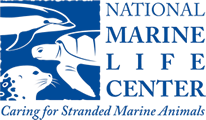Ten Turtles Arrive at NMLC

Last week, ten new Kemp’s ridley sea turtle patients arrived at the National Marine Life Center. All stranded on Cape Cod within the past month suffering from cold-stunning or severe hypothermia. The turtles were rescued by MassAudubon Wellfleet Bay Wildlife Sanctuary and underwent several weeks of emergency care at the New England Aquarium. They will continue their rehabilitation at NMLC for the next 5-10 months.
When the turtles arrived, we reviewed their medical record from the Aquarium, then examined each one. We looked over their carapace (top shell), plastron (bottom shell), and flippers, as well as their eyes, nose and nostrils. If a

turtle had external injuries, we cleaned the wounds and applied “SSD” ointment, a topical antibiotic that adheres well in water. We counted their respirations, took their temperature, and used a fetal doppler heart rate monitor to measure their heart beat. We weighed and measured each, then wrote its “accession number” on their shells with a white paint marker in order to tell them apart

easily in water and make sure each gets the correct food and medicine. This sort of evaluation will be conducted regularly throughout each turtle’s rehabilitation to monitor its progress. The turtles were then placed gently into our rehabilitation pool and offered food.
Herring fillets and sliced squid make up the turtles’ diets. Additionally, they

receive a variety of vitamins to make sure they receive adequate nutrients. Some of the turtles prefer herring while others prefer squid. And then there are the turtles who’ll eat practically anything you put in front of them! (This year, it seems to be #39!)
The next day, veterinarian Dr. “Sea” Rogers Williams examined each turtle then established a treatment

plan. The turtles’ course of treatment over the next several weeks will include antibiotic injections to prevent infection, fluids to address dehydration, and regular wound cleaning with application of topical antibiotics. We will periodically take a variety of diagnostic tests including bloodwork and x-rays to assess their progress. And, we will carefully monitor their food intake to make sure each continues to eat.
Rehabilitating sea turtles takes a lot of time and effort and expense, but we feel it’s worth it. Every one of these critically endangered animals that returns to the wild can help their population recover.
You can help too! Donate today. Your gift pays for the critical food, medicine, diagnostic tests, life support systems, and veterinary care these turtles need to recover.
And, just in time for the holidays, consider a sea turtle adoption for those special people on your gift list! Basic adoptions are $35 (plus shipping and handling), and include information about your adopted animal, a plush sea turtle toy, and a family membership. Or, for the person who has everything, consider giving a naming sponsorship package for a minimum donation of $500. In addition to the basic adoption, this package allows your special loved one to name a turtle, observe a veterinary exam, and shadow our animal care team during daily feeds and treatments. It’s a great way to show you care!

